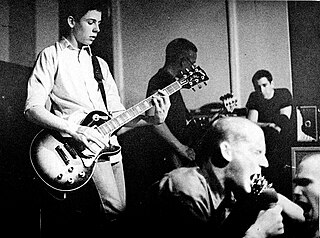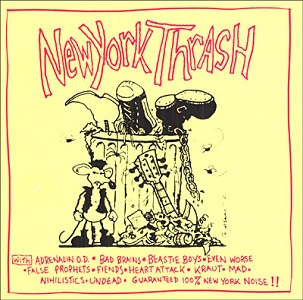
Hardcore punk is a punk rock music genre and subculture that originated in the late 1970s. It is generally faster, harder, and more aggressive than other forms of punk rock. Its roots can be traced to earlier punk scenes in San Francisco and Southern California which arose as a reaction against the still predominant hippie cultural climate of the time. It was also inspired by Washington D.C. and New York punk rock and early proto-punk. Hardcore punk generally disavows commercialism, the established music industry and "anything similar to the characteristics of mainstream rock" and often addresses social and political topics with "confrontational, politically-charged lyrics".

Bad Brains are an American band formed in Washington, D.C., in 1976. They are widely regarded as pioneers of hardcore punk, though the band's members have objected to the use of this term to describe their music. They are also an adept reggae band, while later recordings featured elements of other genres like funk, heavy metal, hip hop, and soul. Rolling Stone magazine called them "the mother of all black hard-rock bands", and they have been cited as a seminal influence to numerous other subgenres in addition to hardcore punk, including various subgenres of heavy metal, such as thrash/speed metal, alternative metal, and funk metal. Bad Brains are followers of the Rastafari movement.
SST Records is an American independent record label formed in 1978 in Long Beach, California by musician Greg Ginn. The company was first founded in 1966 by Ginn at age 12 as Solid State Transmitters, a small business through which he sold electronics equipment. Ginn repurposed the company as a record label to release material by his band Black Flag.

Rites of Spring was an American punk rock band from Washington, D.C., formed in late 1983. Along with Embrace, and Beefeater, they were one of the mainstay acts of the 1985 Revolution Summer movement which took place within the Washington, D.C. hardcore punk scene.
Post-hardcore is a punk rock music genre that maintains the aggression and intensity of hardcore punk but emphasizes a greater degree of creative expression. Like the term "post-punk", the term "post-hardcore" has been applied to a broad constellation of groups. Initially taking inspiration from post-punk and noise rock, post-hardcore began in the 1980s with bands like Hüsker Dü and Minutemen. The genre expanded in the 1980s and 1990s with releases by bands from cities that had established hardcore scenes, such as Fugazi from Washington, D.C. as well as groups such as Big Black, Jawbox, Quicksand, and Shellac that stuck closer to post-hardcore's noise rock roots. Dischord Records became a major nexus of post-hardcore during this period. The genre also began to incorporate more dense, complex, and atmospheric instrumentals with bands like Slint and Unwound, and also experienced some crossover from indie rock with bands like The Dismemberment Plan. In the early- and mid-2000s, post-hardcore achieved mainstream success with the popularity of bands like At the Drive-In, My Chemical Romance, Dance Gavin Dance, AFI, Underoath, Hawthorne Heights, Silverstein, the Used, Saosin, Alexisonfire, and Senses Fail. In the 2010s, bands like Sleeping with Sirens and Pierce the Veil achieved mainstream success under the post-hardcore label. Meanwhile, bands like Title Fight and La Dispute experienced underground popularity playing music that bore a closer resemblance to the post-hardcore bands of the 1980s and 1990s.
Bush Tetras are an American post-punk No Wave band from New York City, formed in 1979. They are best known for the 1980 song "Too Many Creeps", which exemplified the band's sound of "jagged rhythms, slicing guitars, and sniping vocals". Although they did not achieve mainstream success, the Bush Tetras were influential and popular in the Manhattan club scene and college radio in the early 1980s. New York's post-punk revival of the 2000s was accompanied by a resurgence of interest in the genre, with the Tetras' influence heard in many of that scene's bands.

Washington, D.C., hardcore, commonly referred to as D.C. hardcore, sometimes styled in writing as harDCore, is the hardcore punk scene of Washington, D.C. Emerging in late 1979, it is considered one of the first and most influential punk scenes in the United States.

Paul D. Hudson, known professionally as H.R., is an American musician who leads the hardcore punk band Bad Brains, and is an instrumental figure in the development of the genre. His vocal delivery has been described as diverse, ranging from a rapid-fire nasal whine, to feral growling and screeches, to smooth near-crooning or staccato reggae rhymes. He has departed the band periodically to pursue solo efforts that are more reggae than Bad Brains' punk sound. He is the older brother of Earl Hudson, Bad Brains' drummer.

Bad Brains is the debut studio album recorded by American hardcore punk/reggae band Bad Brains. Recorded in 1981 and released on the cassette-only label ROIR on February 5, 1982, many fans refer to it as "The Yellow Tape" because of its yellow packaging, much in the way that the Beatles' self-titled record is often called "The White Album". Though Bad Brains had recorded the 16 song Black Dots album in 1979 and the 5-song Omega Sessions EP in 1980, the ROIR cassette was the band's first release of anything longer than a single.

Fringe Product is a defunct Canadian independent record label which was owned by Ben Hoffman. Genres on the label included punk, rock, metal, hardcore, death metal, industrial and electronic music. Hoffman was also proprietor of Record Peddler Distribution and The Record Peddler from the late 1970s to the year 2000.

Rock for Light is the second full-length album by hardcore punk pioneers Bad Brains, released in 1983. It was produced by Ric Ocasek of The Cars. The 1991 re-issue was remixed by Ocasek and bass player Darryl Jenifer. The re-issued version has some extra tracks, an altered track order, significantly different mixes and, on most tracks, a speed increase of the master which results in a raising of the pitch by one-half step.

New York Thrash is a hardcore punk compilation album released by ROIR in 1982.
Punk jazz is a genre of music that combines elements of jazz, especially improvisation, with the instrumentation and performance style of punk rock. The term was first used to describe James Chance and the Contortions' 1979 album Buy. Punk jazz is closely related to free jazz, no wave, and loft jazz, and has since significantly inspired post-hardcore and alternative hip hop.
Even Worse was an American, New York City-based punk rock band, formed in 1980. Drummer Jack Rabid was the only constant, as the band lineup changed numerous times over the course of the band's four-year existence. Other members included vocalists John Pouridas, John Berry, Garth Ripton, Rebecca "R.B." Korbet and Ken "Tantrum" Tempkin; guitarists Dave Stein, Robert Weeks, Thurston Moore and Steve Waxman; and bassists Nick Marden, Eric Keil and Tim Sommer.

This is a comprehensive discography of Bad Brains, a Washington, D.C.-based hardcore punk band that also plays reggae and uses styles of funk and heavy metal into their music. To date, the band has released nine full-length studio albums, four EPs, four live recordings, one compilation album, one demo album, and more than a dozen singles.
Neil Cooper (1930–2001) was the founder and head of independent US cassette and record label ROIR.
Adrenalin O.D. was an American hardcore punk band from New Jersey that existed from 1981 to 1990. They are best known for playing extremely fast music accompanied by humorous lyrics.
Propaganda Records company and Propaganda label are an independent Finnish record company and a record label established in 1981. Since the beginning Helsinki-based Propaganda specialized in independent punk music and hardcore. The label dominated the Finnish hardcore punk and underground scene from the early 1980s until 1986. Releases were soon distributed in West Germany, Brazil and the United States. They soon began reissues in West Germany.
Reggae punk is a genre of music originating in England in the late-1970's. It is characterized by a fusion of reggae music with punk rock. The genre originated amongst punk rock artists who mixed in reggae elements into their punk rock sound. The most notable band to do this was The Clash, having done so on many records. They even covered reggae songs such as Toots and the Maytals' Pressure Drop, released as the B-side to English Civil War, both from 1978's Give 'Em Enough Rope. Bob Marley also gave a nod to this genre by writing and recording "Punky Reggae Party" in 1977.
The Stimulators were an American punk rock band from New York City. Although they have a limited discography, they are notable for being consistently cited as an important transitional band between the late-1970s New York City punk rock scene and New York hardcore, and for being the musical entry point for future Cro-Mags founder Harley Flanagan.









